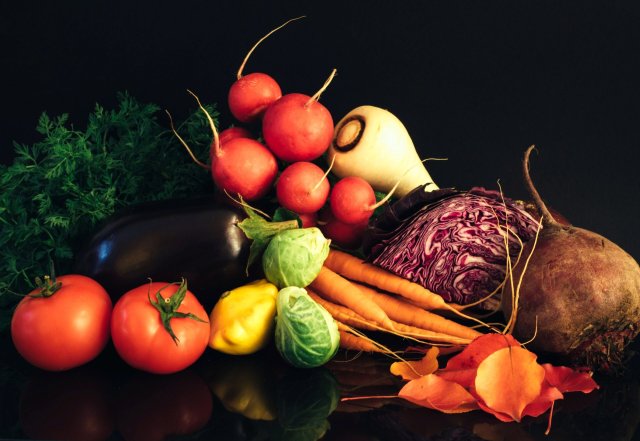In addition to vitamins, fresh plant foods also contain health-promoting bacteria.
Foto: Unsplash/Sharon Pittaway
Consuming fruit and vegetables has a positive effect on the functional diversity of the microorganisms that colonize the intestines – the intestinal microbiota. This is encouraged by frequent consumption of as diverse a variety of vegetables as possible. The diversity of the intestinal microbiota, in turn, is crucial for human health. Wisnu Adi Wicaksono and Gabriele Berg demonstrated this connection in a meta-study at the Institute for Environmental Biotechnology at Graz University of Technology, which was published in October in the journal »Gut Microbes« has been published.
Microorganisms of plant origin have probiotic and health-promoting properties. Bacteria such as Enterobacterales, Burkholderiales and Lactobacillales (lactic acid bacteria) occur in both the human microbiome and the environmental microbiome because they colonize both fresh fruits and vegetables and the human intestine. (Probiotic properties means: Provided with lactic acid bacteria, which are intended to improve the structure of the intestinal flora. Without being harmed by stomach and bile acids, they pass through the stomach to develop their effect in the intestines.)
A microbiome includes all microorganisms that colonize a macroorganism, i.e. human, animal or plant, or a part of it, such as the intestine or a fruit.
First, the team created a catalog of microbiome data from fruits and vegetables in order to be able to identify the bacteria. They compared this with publicly available data from two studies on intestinal flora. Using a long-term study, the researchers analyzed the intestinal flora of babies, but also of adults – in both cases, data on the subjects’ food intake was available. Of a total of around 2,500 stool samples, each contained between one and ten million sequences – several billion sequences were evaluated. Using this extensive data set, the scientists detected fruit and vegetable microflora in the intestines.
The result confirms the assumption that the health of humans, animals and the environment are closely linked, explain the authors. They suspect that health-promoting bacteria are responsible for the production of vitamins and short-chain fatty acids in the intestine. Therefore, the consumption of fruits and vegetables has a positive effect on the functional diversity of the intestinal microbiota.
influence in early childhood
Scientists assume that the development of the immune system is positively influenced by the consumption of fruit and vegetables, especially in the first three years of life, as the intestinal microbiome develops during this time. But even afterwards, a high diversity of intestinal bacteria promotes health because it makes the organism more resistant and resilient, explains institute director Gabriele Berg, who is already working on an intervention study in an international team as part of a follow-up study. To do this, people on three continents have to eat the same thing over a certain period of time, and then the scientists analyze their excretions.
Agriculture, processing companies, but also storage and processing also have a major influence on food, the scientist points out. She is convinced that because soil and fertilizer, like pesticides, have an impact on the plant microbiome, fresh fruit and vegetables will always be the healthiest. Every fruit and vegetable has a unique microbiome, on the basis of which a personalized diet can even be put together.
Positive effects of fermentation
Fermented foods also increase the diversity of the intestinal flora, like one Study at Stanford University in 2021. During fermentation, bacteria produce chemical substances that are important for the intestines. This in turn reduces the risk of colon cancer. Butyric acid appears to be an important component because it stabilizes the DNA in the stem cells. For example, inflammatory reactions such as those that occur in rheumatic diseases could be regulated.
Vegetables that are particularly suitable for fermentation are those that are not too soft, such as cabbage, root vegetables, beans, beetroot, pumpkin or peppers. Softer vegetables may fall apart during fermentation.
In countries where there is a lot of fermentation, people have remarkably good intestinal health, scientists have found. Popular products include natural yogurt, kefir and sauerkraut. The latter is produced via so-called lactic acid fermentation. The herb naturally contains the bacteria that are necessary for this and which essentially pre-digest the food. By specifically removing oxygen from food and adding salt, “bad” bacteria cannot multiply. The lactic acid bacteria eat the sugar and starch in the cabbage and convert them into lactic acid, which is why the pH value drops – this works without oxygen. The end product becomes sour and remains edible for a long time – with many vitamins such as C, B2, B12, folic acid and other ingredients.
Not only sauerkraut, but also the Japanese miso paste and the Korean dish kimchi are based on this type of fermentation. Nutritionists recommend consuming fermented foods every day – preferably organically produced, because they contain more bacteria that are important for fermentation.
Subscribe to the “nd”
Being left is complicated.
We keep track!
With our digital promotional subscription you can read all issues of »nd« digitally (nd.App or nd.Epaper) for little money at home or on the go.
Subscribe now!
